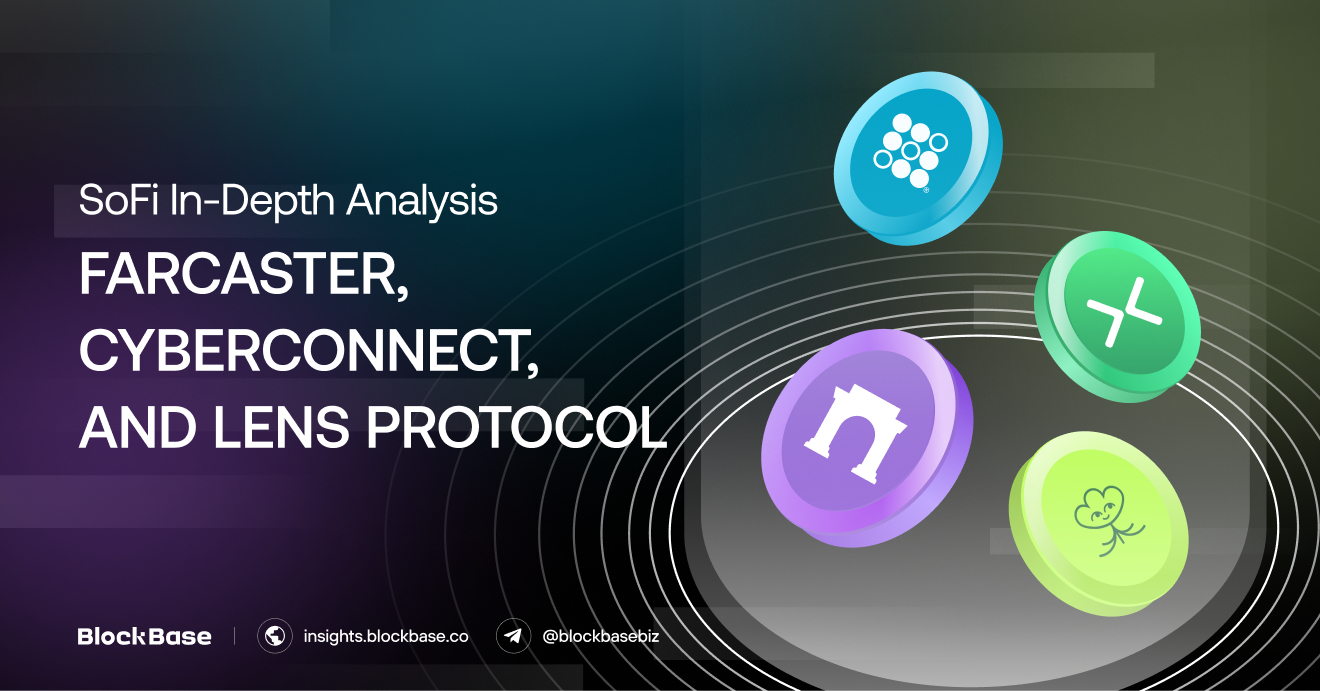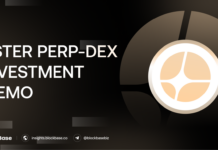1. Key points – Takeaways
- Farcaster is a leading protocol with close up is Lens Protocol in terms of DAU & Protocol revenue;
- Farcaster is open to on-board more dApps using the Frame mechanism to work with its native SoFi dApp – Warpcast;
- CyberConnect is emerging as another significant player in the decentralized social infrastructure space, offering unique features like CyberDB and native yield, though it faces challenges in maintaining consistent user growth and engagement.
2. Social Finance (SoFi) explanation
Social networks are among the most important platforms on the internet today, with the five largest generating about $150 billion annually. However, strong network effects have trapped users within the confines of Big Tech’s walled gardens, maintaining a take rate as high as 99%.
Decentralized social networks, however, have the potential to significantly reduce this take rate. Hundreds of billions of dollars can be redistributed to creators, users, and developers, creating a virtuous cycle of creativity and innovation. This could enable millions to earn a living from content creation, thereby fostering profound creativity. A decentralized social network also eliminates the platform risks posed by centralized Big Tech, motivating developers to further invest and build. With better tools developed and data owned by users, everyone can enjoy a better experience free from lock-in.
3. Narratives – Why does a decentralized social network make sense?
- Traditional relationships between brands, customers, and ad platforms lean heavily in favor of the platforms.
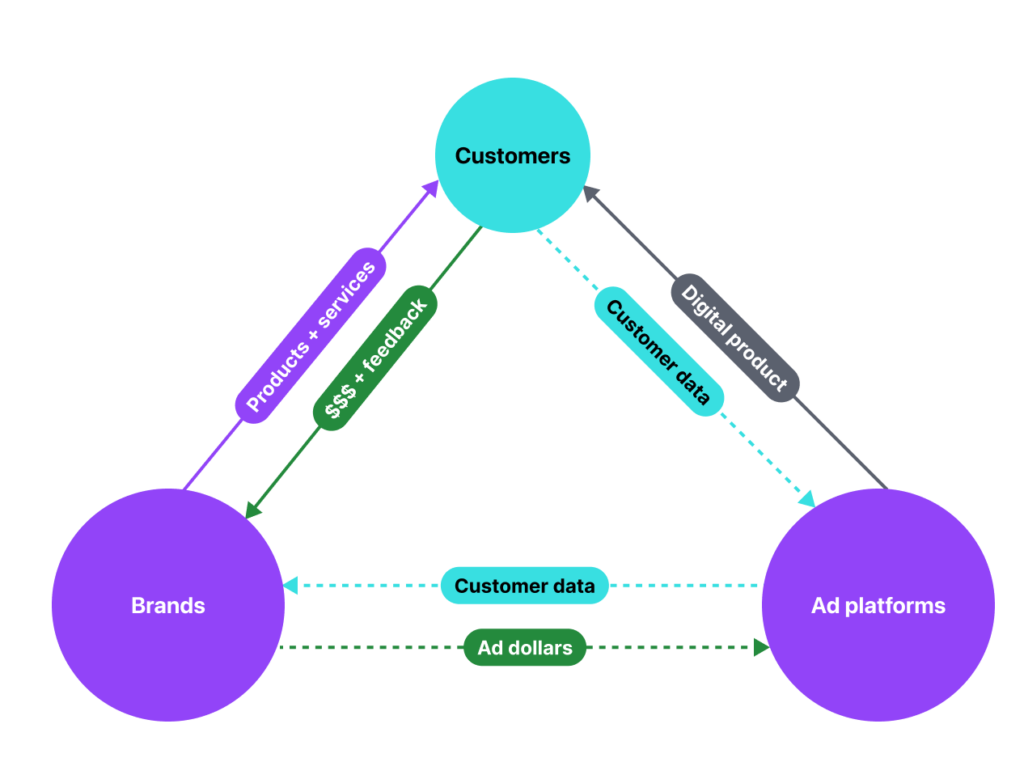
- Blockchain technology unlocks the ability to verify an individual’s identity & activity and reward them across platforms.
One of the major advantages of blockchain technology is that it’s a common language and a shared system of publicly verifiable records. Since it’s an open system, anyone (i.e. an artist or brand) can add integration endpoints to authenticate actions — and because those endpoints are standardized, a single person can carry a single identifier (called a “wallet”) anywhere across the physical or digital world.
In the case of an artist or brand, which operates across many different channels & platforms, this means that they can now track a person’s actions across any of those channels.
Closed System → Open SystemSingle platform sees individual customer data with many brands →Brand sees individual customer data across many platforms.Platform owns data → Customer owns data
- With web3 technology, value can now accrue to brands and customers, and away from major ad platforms.
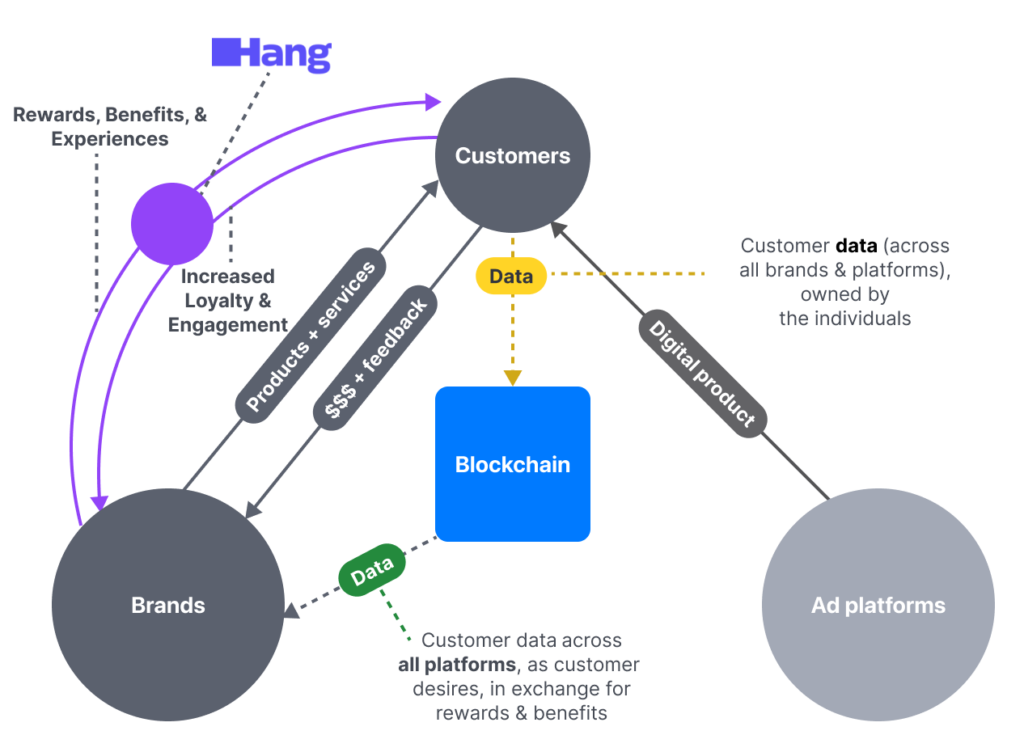
The new relationship between brands, customers, and platforms is being transformed by blockchain technology.
For instance, consider a dedicated Snoop Dogg fan who engages across multiple platforms—attending concerts, following social media, watching podcasts, and listening to music on Spotify and Apple Music. Traditional metrics like Spotify Wrapped may undercount this fan’s engagement, missing their true loyalty.
If Snoop Dogg wanted to reward his top 1,000 fans with exclusive merchandise or access to a private event, he might overlook dedicated fans due to limited data from single platforms. However, by creating a blockchain-based membership program that integrates all his channels—social media, streaming platforms, concerts, and online stores—Snoop Dogg could track and reward true fan loyalty more accurately.
This approach can be applied broadly, including for businesses like a coffee shop with various sales channels and social media presence. Blockchain technology simplifies tracking and rewarding customer engagement across diverse platforms and retailers.
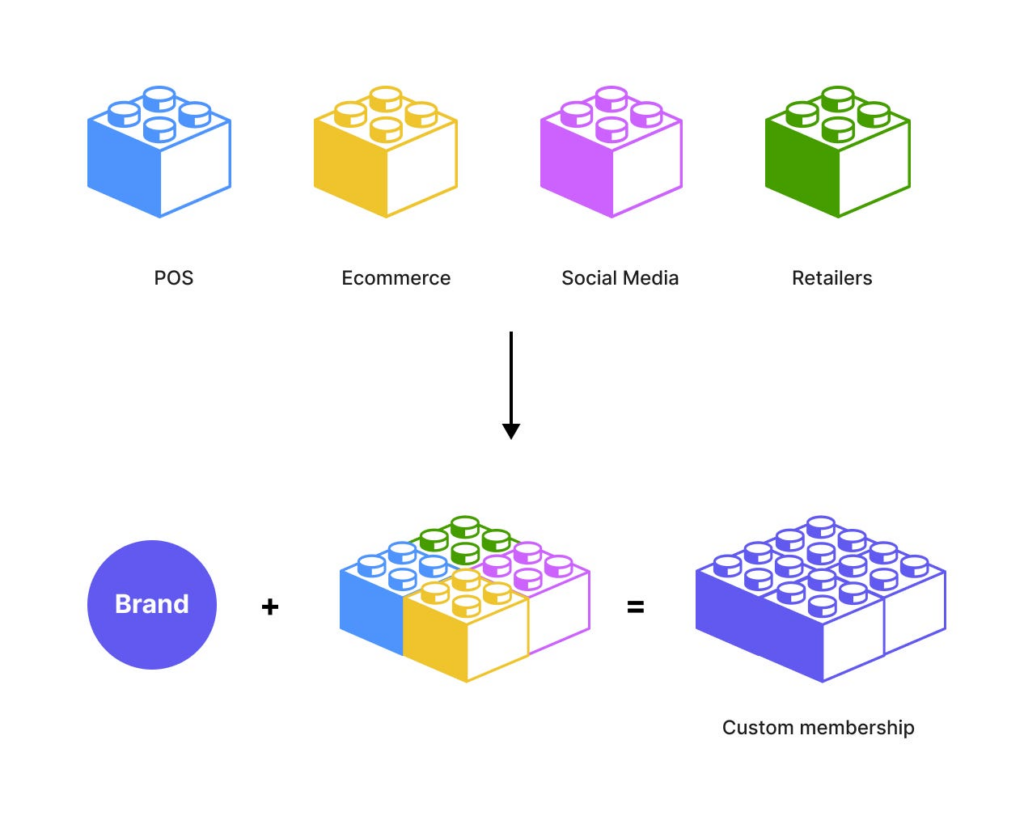
4. Decentralized network protocol in Web3
Let’s deep dive into some notable network that catches attention from worldwide users on SocialFi.
4.1. Farcaster
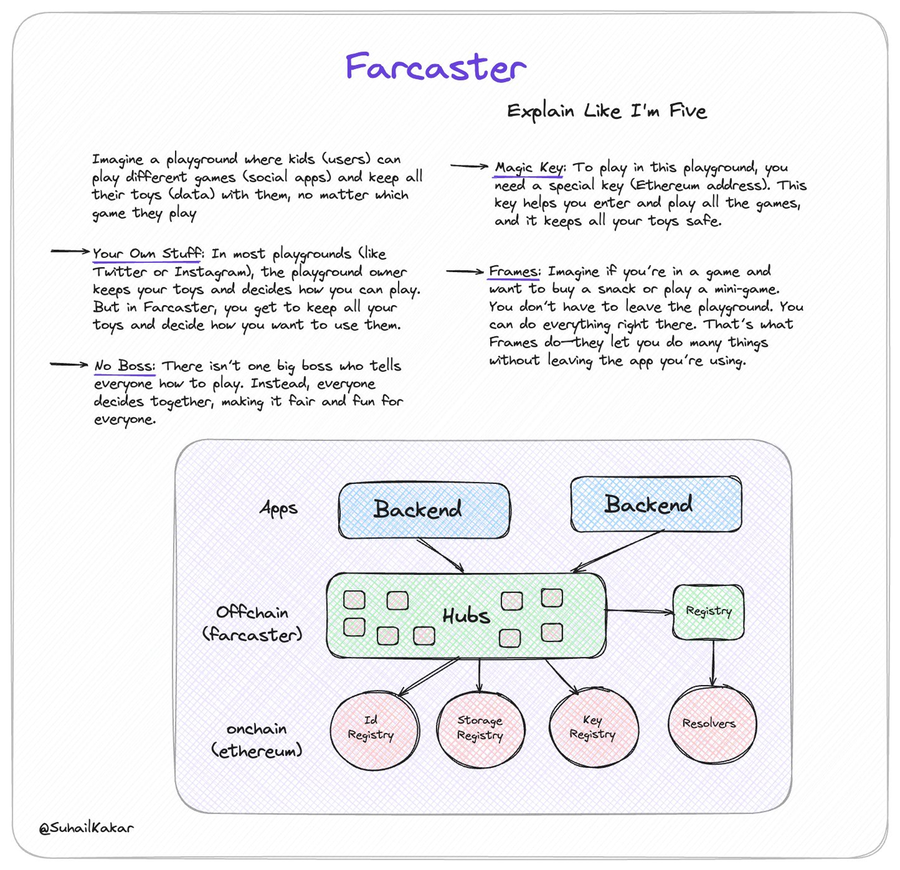
4.1.1. What is it? And the tech behind it
Nature: Decentralized Social Network. Farcaster is designed as a decentralized social network protocol. It aims to allow users to interact and maintain their data on a decentralized network rather than a centralized platform. Its focus is on enabling a decentralized social graph and interactions.
4.1.2. Key Components
- Decentralized Social Graph: Instead of having a central company (like Facebook) manage all your friends and connections, Farcaster uses a distributed system. This means that your network is managed by many different nodes, not just one company. Farcaster achieves this decentralization through a hybrid architecture, combining on-chain and off-chain elements. The on-chain part, managed by contracts on Optimism Mainnet, ensures security for critical actions like account creation and key management. The off-chain component involves a distributed network of Hubs that store and manage user data, interactions, and social connections.
- Federation: It’s like having different social networks (like Twitter and Facebook) that allow for seamless communication and interaction across different decentralized applications (dApps). Farcaster’s use of a distributed network of Hubs supports a federated model. Each Hub can communicate with other Hubs, allowing users to interact across different parts of the network.
- Token Economy: Farcaster uses its native tokens to reward users for activities and participation. This is like earning points or credits for your interactions. Although Farcaster’s current architecture primarily focuses on a hybrid on-chain/off-chain model and does not directly mention tokens for rewards in the provided details, the general idea of a token economy could involve using tokens for various functions within the network, such as incentivizing user participation or managing access to features.
- Frames: Frames are a way to build interactive apps that run directly in a Farcaster social feed: https://docs.farcaster.xyz/developers/frames/
- dApps => general dApp, SoFi dApp
Currently, Farcaster hosts numerous projects and networks tied to its protocol, with most activity centered around Warpast. Some projects use Frame as a gateway to their dApps. Warpast is the most popular social media app on the platform, boasting a larger user base. Consequently, other dApps leverage Warpast to broadcast information about their services
Example of prediction market Polymarket leverage Farcaster

With normal social media apps, the project can paste images and links to polymarket with Frame technology, users now can start betting on the Warpast platform.
Some other notable use cases using Frame:
- Spot and mint wild animals on a live feed of a watering hole in the Namib Desert with Safaricaster
- Make an onchain payment to another user with Paybot
- RSPV to an Eventcaster event
- Yoink the flag in this simple yet viral social game
- Generate a Waifu NFT based on your Farcaster profile
4.1.3. On-chain analytics
Protocol Overview



4.2. Lens Protocol
4.2.1. What is it? And the tech behind it
Nature: Decentralized Social Graph Protocol
Description: Lens Protocol is a decentralized social graph protocol that allows users to own their content and connections on the blockchain. It enables the creation of decentralized social applications where users have control over their profiles and interactions.
4.2.2. Key Components
- Profile NFT: Think of this as your unique digital ID card. It keeps track of everything you post, comment on, and who follows you.
- Handles: This is like your username on Lens. You can have multiple handles, and they can be easily moved around or sold.
- Profile Manager: Allows you to let someone else manage your account for you, like having an assistant for your social media.
- Profile Guardian: A safety feature that makes sure no one can steal your profile without your permission. If someone tries to move your profile, there’s a waiting period where you get a chance to stop it.
- Publications: These are the posts, comments, and shares you make. They’re all tied to your Profile NFT.
- Open Actions: You can add special actions to your posts, like allowing people to buy something from your post or vote on a poll.
- Collect: This lets people buy your content as digital collectibles. Imagine selling a special post or picture as an NFT. Lens lets you own and control your social media profile and content. You can manage your profile, keep it secure, and even make money from your posts.
Overview stats of Lens protocol
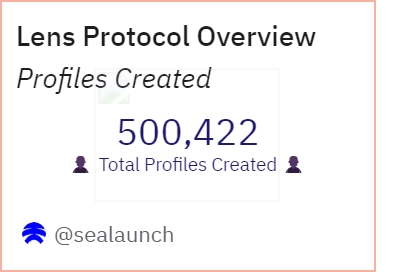
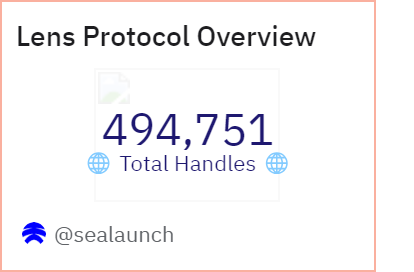
There are around 500K profiles created along with the number of handles the loss of 6k handles may relate to some profile minted but not active use.
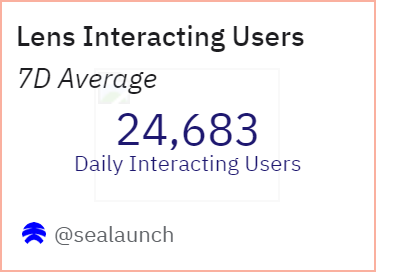
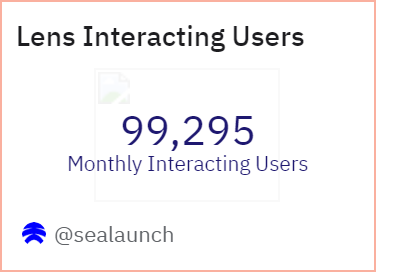
Daily active users relay around 25K members and 100K monthly active users at the time of 8/8/2024.
Protocol Revenue
Currently, Lens Protocol has two revenue streams:
- Lens Profiles Mints since going permissionless on 27/02/2024.
- Paid Collect Fee (5%) since 13/03/2024, approved by LIP-16
Total Protocol Treasury

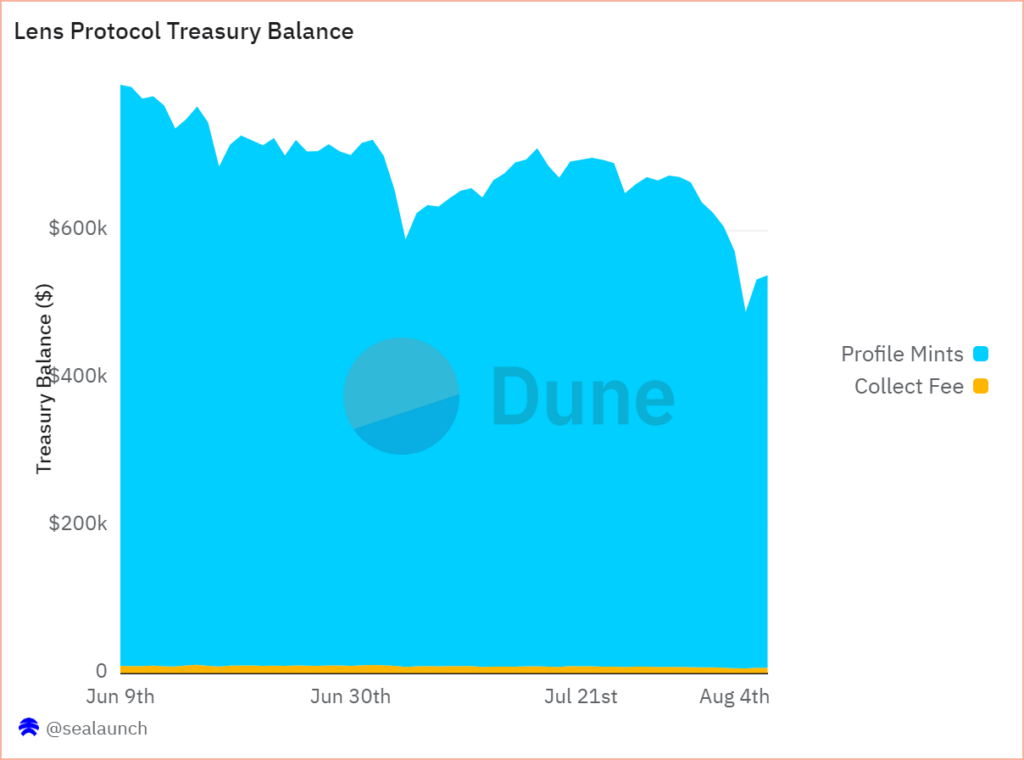
In this $539,227 Protocol Treasury, $7,119 comes from the collection fee and $532,132 comes from profile mints. Indicate Lens is currently making money from people who come and create profiles to access Lens SoFi dApps, but when they got in majority of them hadn’t used many functions related to Collect Post activities.
dApps: general dApp, SoFi dApp user interactions table
List of mentionable dApps available on the platform and on-chain facts:
Orb | Hey | Phaver | Kaira | Buttrfly | Tape | Yup | Bloomers.tv | Lenspeer | Firefly | t2.world
| App name | Orb | Hey | Phaver | Kaira | Buttrfly | Tape | Yup | Bloomers.tv | Lenspeer | Firefly | t2.world |
| Interacting user per app (%) | 9 | 25 | 60 | < 5 | < 5 | < 5 | < 5 | < 5 | < 5 | < 5 | < 5 |
| Interacting user per app | 338,091 | 622,209 | 1,270,592 | < 50,000 | 98,000 | < 50,000 | < 50,000 | < 50,000 | < 50,000 | < 50,000 | < 50,000 |
| App used (publications & reactions) (%) | 40 | 20 | 25 | < 5 | 5 | < 5 | < 5 | < 5 | < 5 | < 5 | < 5 |
| App used (publications & reactions) | 6,222 | 2,424 | 3,787 | < 500 | 759 | < 500 | < 500 | < 500 | < 500 | < 500 | < 500 |
Users counted on 9000 points on a 0 to 10000 scale of profile quality points P(Q) represents the Profile Quality Score, a comprehensive metric used to assess the overall quality of a user profile, with scores ranging from 0 to 10,000 where higher scores denote better quality.

- It’s worth noting that many users only engage with 1 or 2 apps
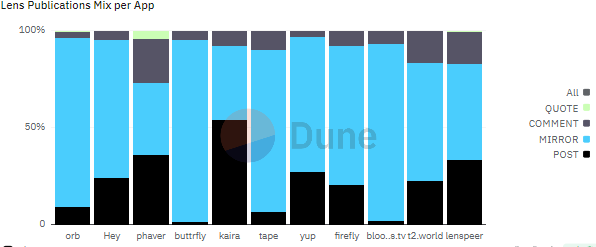
- The majority of apps, over 70% of each app users only “Mirror”, which retweets the posts, and 20% of actions are posted. The rest belong to comments and quotes.
4.3. Cyberconnect
4.3.1. What is it? And the tech behind it
Nature: Decentralized Social Infrastructure Layer
Description: Cyber Connect, particularly through its Cyber L2 and associated technologies, aims to build a decentralized infrastructure layer for social interactions and applications. It uses a decentralized sequencer, and decentralized storage (CyberDB), and integrates with other decentralized protocols to create a broad decentralized social ecosystem.
4.3.2. Key Components
- Account Abstraction: Instead of having a basic crypto wallet, you get a smart wallet that can do more things, like paying for transactions in different ways or automatically handling complex tasks.
- CyberDB: This is a special storage system that keeps social data safe and cheap to store. It’s like having a giant, secure cloud storage specifically for social data.
- Decentralized Sequencer: Ensures that transactions (like sending or receiving money) are processed quickly and fairly. It’s like having multiple people manage the traffic lights to keep things running smoothly.
- EigenDA: A system that makes storing and accessing data much cheaper and more scalable, like having a more efficient way to handle all the data traffic.
- Native Yield: Lets you earn rewards on your assets while they’re in Cyber L2, kind of like earning interest on money you save in a bank.
In Summary: Cyber L2 speeds up and makes transactions cheaper on Ethereum, especially for social applications. It offers advanced wallets, efficient data storage, and rewards for your assets.
Overview stats of CyberConnect protocol
Monthly Active address – MAU
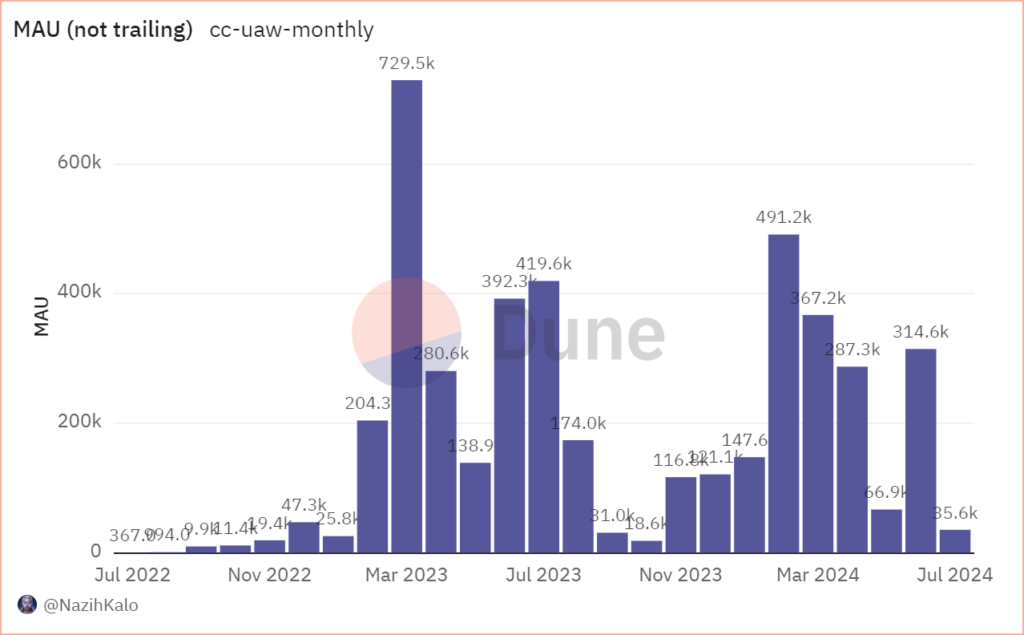
- Peak in March 2023 with events of FanClub function and Connected 2023 hackathon,
- In March 2024, they reached another high column of 491K MAU due to announcing the launch of its modular Ethereum Layer 2 network.

- The number of profiles is high at 1.2M this increase may be due to it being free to mint the profile and multiple profiles can be owned by various wallets to airdrop activities and fake data of certain apps on the Cyber ecosystem.
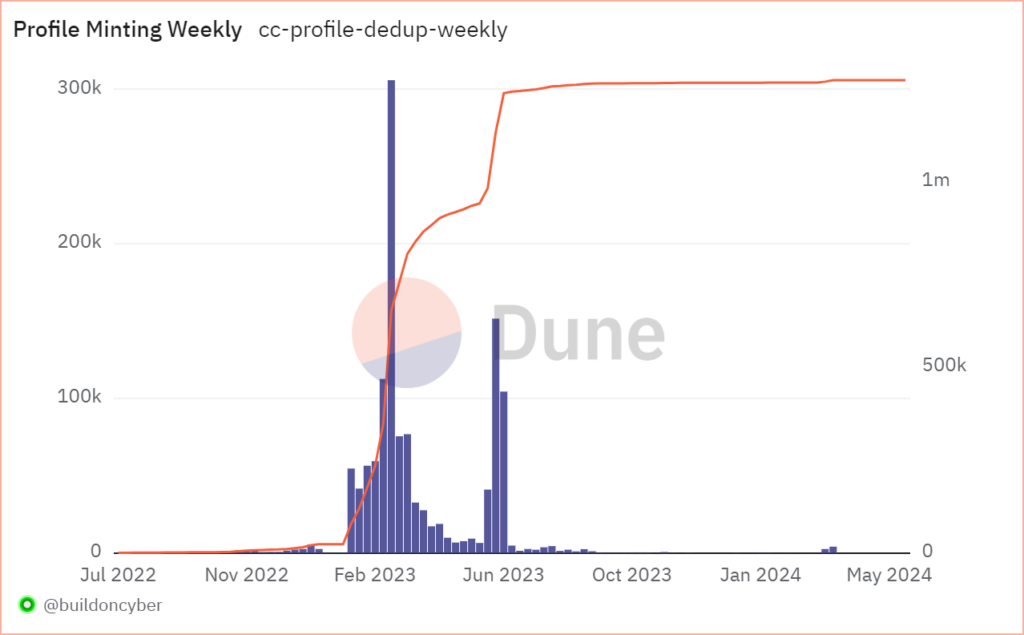
- This is backed by the data of Profile Miniting daily drop since 2023 and only light peak again in 2024.
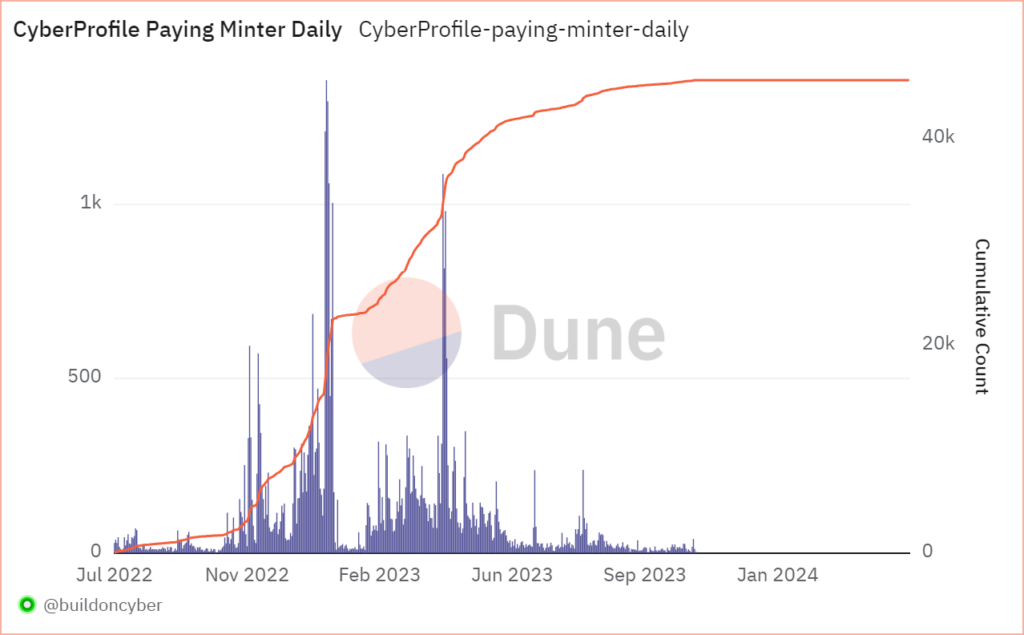
dApps => general dApps, SoFi dApps
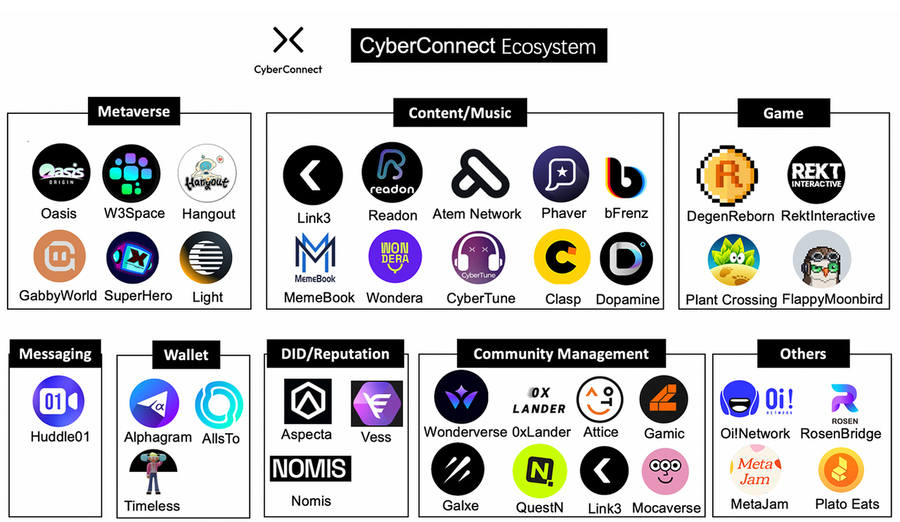
The CyberConnect ecosystem comprises of a variety of dApps:
- GameFi: Flappy Moonbird, Hangout, DegenReborn, Plat Crossing;
- SoFi: Phaver, Oi! Network, Plato, Light, Bfrenz, WONDERA, Link3, CyberTune,…
- DeFi, Timeless Wallet, Alphagram,…
CyberConnect Content (EssenceNFT) and Content Collection on SoFi apps: Link3
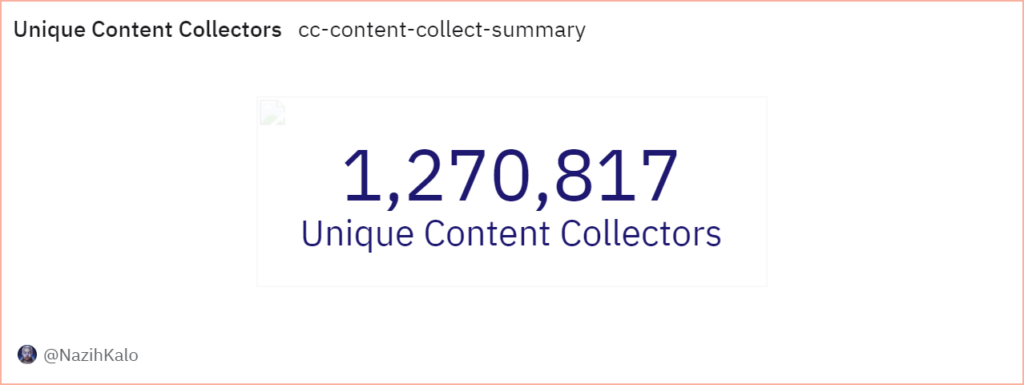
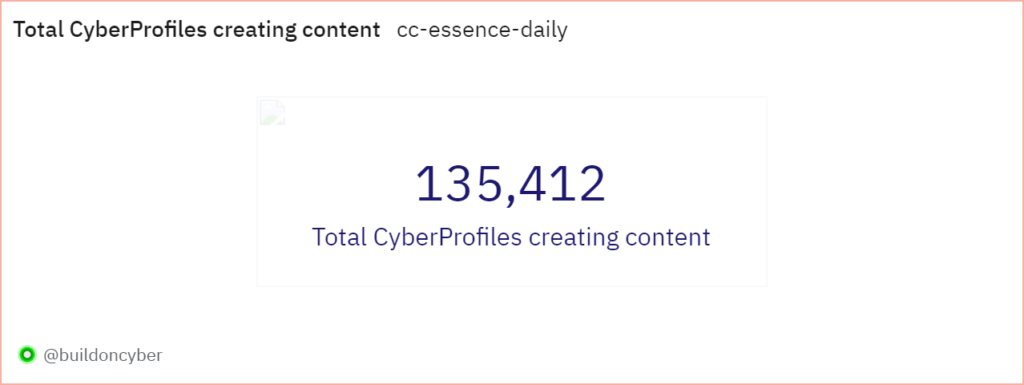
Almost every account on Cyber has collected some content and 1/10 of the users have created at least one content in some way.
Source: Dune Analytics
But we also see a drop in number of content collected since 2023
Same thing with content registered (post) we can see that there are fewer posts gradually since 2023
Short Comparison (YTD, Latest Day)
| Metric | Daily Interacting Users | Monthly Interacting Users | Cast/Repost/Mirror | Profiles Creation | Total Publications | Protocol Treasury | Transactions |
| Farcaster | 46,480 | N/A | 632,112 | 646,317 | 1,936,345 | 3,432,350 USD | 164,676 |
| Lens Protocol | 24,683 | 99,295 | 6,785,615 | 502,133 | 4,899,528 | 539,227 USD | 586,415 |
| CyberConnect | 1,276 | 125,789 | 11,514,953 | 1,274,366 | 1,936,345 | N/A | 16,757,972 |
Lens Protocol vs Farcasters according to Dune Analytics dashboard
Publication

Reactions

Open Actions vs Frames

Daily transactions

5. Conclusions
Decentralized social networks like Farcaster and Lens Protocol are emerging as promising alternatives to traditional centralized platforms, offering users greater control over their data and content. Farcaster has gained traction with its innovative frame mechanism and synergies, while Lens Protocol provides a decentralized social graph that enables users to own their profiles and interactions. Both protocols are seeing growing adoption and development of dApps in their ecosystems, though they face challenges like improving user interfaces and reducing transaction costs.
As these platforms evolve, they have the potential to redistribute value from big tech companies to creators and users, fostering a new era of online creativity and engagement. However, continued innovation in areas like blockchain economics and scalability will be crucial for decentralized social networks to achieve mainstream adoption and compete with established centralized platforms.
The information provided in this article is for reference only and should not be taken as investment advice. All investment decisions should be based on thorough research and personal evaluation.


